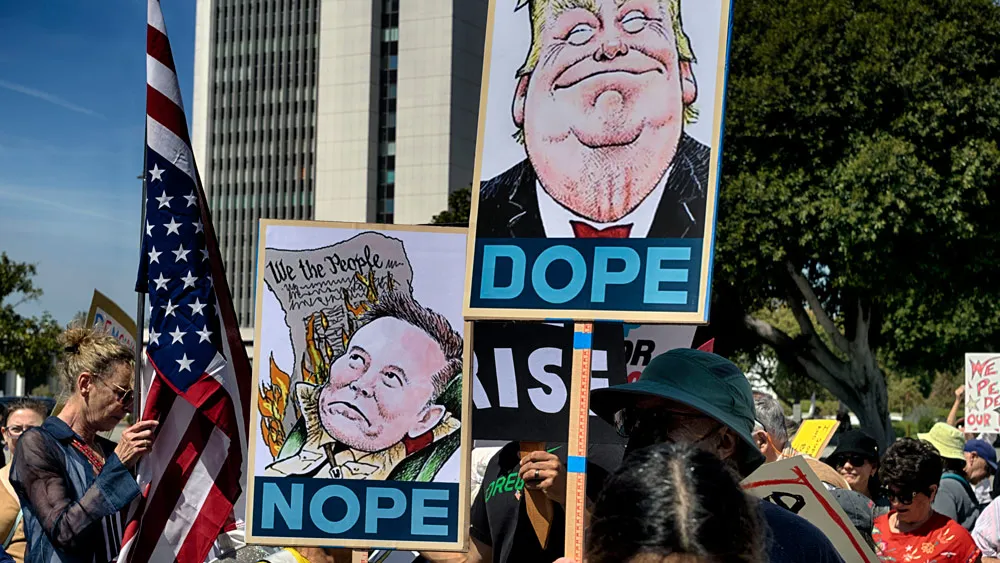June 7, 2010
Dieter and Sex and the City
Kilian Melloy READ TIME: 7 MIN.
"Please?" Dieter pleaded.
"C'mon," Dieter cajoled.
"Well?" Dieter whined.
"You hated the last one," I pointed out. "Why do you want to go this time?"
"Hope springs eternal," my cousin responded.
I was skeptical: from the first glimpse of the poster for the new movie--a bling-encrusted image that screamed "FLUFF!" with countless sparkling but shrill decibels--I'd feared the worst. Then I read an article in Entertainment Weekly that plunged my expectations even lower. A desert-bound thesis on global feminism? A clash of cultures that pits modern gender roles against antiquated male chauvenism?
"It's going to be stylish and funny," Dieter argued. "It's going to be a contemporary take on classic road comedies of yore."
"Of yore?"
"It'll be sprawling, opulent, exotic! It'll be..."
"Two hours and twenty minutes long. It'll be like watching half a season in one sitting," I warned him.
"C'mon, just take me to the screening!"
So I did--of course I did; my cousin is straight, but he's the biggest Sex and the City freak this side of those flocks of women who go to Manhattan just to take the bus tour to sites featured in the TV show, sighing and swooning as the itinerary takes them past Carrie Bradshaw's address or the fountain where she broke up with Big the first time (or, mayhap, the fountain where she broke up with Aidan the second time). Sex and the City 2 was a red-letter event in Dieter's private calendar of national holidays.
At the theater, Dieter popped into the men's room while I waited in the corridor, which was swiftly turning into a river of swiftly-moving Carrie and Company Clones: scads of women dressed to the nines (for a movie screening? On a Monday night??). I'd seen people dress as hobbits to go to the trio of Lord of the Rings films, and kit themselves out as Starfleet officers to attend Star Trek movies, but this was something new. Carrie Bradshaw's voice came into my head: "I had to wonder: are movies centered around food and clothes the female equivalent of sci-fi and fantasy epics?"
As I watched, a quartet of well-dressed women went by; I took note of their "types," picking out two blondes (that skinny one with the frosted mascara would be "Carrie," and the other one, her with the salacious grin, would be "Samantha") and a brunette (a total Charlotte) and... oh, thank God, another brunette. The situation wasn't hopeless.
Then one of the brunettes diverged from the pod--she wasn't really in their group--and a red-head stepped into the gap. Wait: that was no Miranda clone... that was a man... dressed in a sloppy old sweatshirt... in fact, it was Dieter!
I hurried to catch up. "Dude, what the hell? Slow down."
"We gotta get decent seats!"
"We'll be fine, they always reserve a couple of rows for press."
"Yeah, until they don't." Dieter sped off. I tracked him down a few minutes later: he'd plunked himself in a prime vantage point and saved me a seat next to him.
From the movie's opening scenes, Carrie Bradshaw was one annoying bitch. In the TV show she'd been funny, articulate, quick-witted; or was that simply the way nostalgia and selective memory made me recall her? Here, she started off self absorbed, referring to New York City pre-1986 as "B.C.--Before Carrie!" Uh, right. Even as the movie re-introduced the four female friends, all married now except for Samantha, it took time to remind us who the men in their lives were. The action took us to a posh gay wedding in Connecticut (where Samantha got loudly banged by the straight younger brother of one of the grooms), and then to Manhattan, where the men were summarily put out of the picture when Samantha was offered a business-related trip to Abu Dhabi for herself and her friends.
The drama centered around Carrie worrying that she and husband Big would shrivel and turn tedious. (Too late.) Oh, and Miranda had a jerk of a male boss who hated it when she sought to contribute in any way. And Charlotte had a two-year-old who wouldn't stop crying. Even Pauline would scoff at perils like these, I thought, with a roll of the eyes.
Dieter sat next to me, entranced, and I wondered--not for the first time or even the thirty-sixth--if he were gay and just didn't know it.
Samantha's gig was that she was hitting menopause, but fighting back with supplements and hormones. "By the time you all are fifty, I'll be thirty-five," she assured her skeptical gal pals. But Carrie was the one who seemed to be aging in reverse. I was sure of it now: in the TV version, she was a flaky woman, but still a woman. Here, she was more and more girly-girl in the whiniest of ways. I felt my teeth grinding, and winced to think of what my dentist would have to say. "You're not wearing your Night Bite!" Dr. Chew would scold me. And what could I say in my defense? I was at a movie about four New York women who epitomize some sort of post-modern fairy tale about being independent and yet also taken care of by doting men?
If Carrie's high-pitched shriek, just on the verge of the range of human hearing, grated on the nerves, her wardrobe out-and-out severed them. On TV, her character was always about fashion, but there was a level of self-mockery built into the show that defused the worst of her wardrobe. In the new movie, no such levity exists: Carrie wears a Cher-like crown to a wedding, what looks like a burlap hat on a super-deluxe jet ride to Abu Dhabi, and an air of self-importance that anyone other than the saintly Mr. Big (played by Chris Noth) would respond to either with divorce or strangulation. "You know I'm more Coco Chanel than coq-au-vigne," Carrie tells her husband in one scene (and, regrettably, that's about as good as her celebrated punning style gets this time around). Most men would react to that pronouncement by slathering her in wine and garlic and then shoving her head-first into an oven; Big, evidently inured to this sort of thing, lets it pass.
The movie is supposed to be a jewel-encrusted cream puff that fulfills wishes of wealth and takes us away from the ongoing recession on a wispy cloud of fantasy that remains blissfully imperturbable by issues of political substance. (Cf. that over-the-top gay wedding.) As such, Sex and the City 2 dwells in a closely confined narrative space.
There's an air of cultural condescension--the Arabian men are hotheads more or less looking for occasions of outrage when they can bluster can call for the cops; the help, imported from India, is helpful, polite, and uniformly male, which sends Samantha into joyous paroxysms (never mind that her personal butler--an accessory provided by the hotel, so overwhelmingly extravagant in its appointments that it surely has a sixth star to its credit--is overtly gay). But the offensive cultural stereotypes are offset by observations of America's own sexual imperialism: strong women are undercut, ignored, or silenced by entitled, uneasy male superiors, as happens to Miranda in the film's first act.
Where was the funny, juicy road movie of yore, to borrow Dieter's phrase? Was it about to arrive along with Carrie's former flame, Aidan? He turns up in a souk--small world, eh?--and Carrie decides to hang with him for an evening, despite Charlotte's warnings that she's "playing with fire." All that happens is one spontaneous snog, which is pretty meek stuff all in all, but this is Sex and the City (even though it's been removed to another country), so a kiss is not just a kiss; "It's against the law!" Carrie cries. Well, in Abu Dhabi, maybe; in New York, it's nothing, except to Carrie and Big.
Once more, Samantha is a voice of reason... which, really, is kind of a sign that something isn't right. Samantha isn't supposed to be the one who brings things back to earth, though she's as earthy as they come... sometimes a little too much so: a purse full of condoms can get a girl into ever so much trouble in the wrong country.
There is one funny, emotionally honest passage in the film, and it takes place between Miranda and Charlotte, the cast's two mothers. Charlotte has always dreamed of a picture-perfect life, in which she is the picture-perfect mother; what she discovers is that taking care of two little kids is no Hallmark fantasy even with a cute, good-natured (but worryingly braless) nanny on hand to help. Miranda, sitting her down, advises her to sip at a drink and let out the dark thoughts and dissatisfactions that Charlotte dare not voice. "Sip!" Miranda commands, as Charlotte stumbles toward an ultimately cathartic confession. The two agree that mothering is a tough job, indeed; "To them!" they toast all the mothers in the world who don't live in penthouses equipped with live-in child care.
Even the Carrie and Company Clones appreciated this sentiment: the theater filled with a sigh of gratitude.
Next to me, Dieter was positively sweating with delight at the whole production: the vast sands of the desert, the fluffily merengue-like drama, a rendition of "I Am Woman" that the four New York gals belt out in a karaoke bar, and one scene in which the latest fashions, obscured by burqas, are finally allowed to see the light of day.
My sigh of gratitude arrived with the end credits. "Happy?" I asked my cousin as we filed out.
He just about gave me kiss of thanks.
"Next time, it's a summer sci-fi blockbuster," I warned him. "In other words, the male equivalent of Sex in the City. And you're buying the tickets."
Kilian Melloy serves as EDGE Media Network's Associate Arts Editor and Staff Contributor. His professional memberships include the National Lesbian & Gay Journalists Association, the Boston Online Film Critics Association, The Gay and Lesbian Entertainment Critics Association, and the Boston Theater Critics Association's Elliot Norton Awards Committee.







